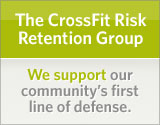"Quality"
Much discussion is given about the best way to 'game' certain workouts. With the rise in popularity of events such as the CrossFit Games (and the popularity of CrossFit in general), many people seem to be equating 'best workout' with 'best strategy for a particular workout', instead of best effort put forth on a particular workout.
Let's look at a very basic example, the CF workout 'Helen', which is done for total time:
400m Run
21 Kettlebell Swings
12 Pullups
Repeat 3x
If competition was important to me and I absolutely had to beat Kelly and Angel (it's an ego thing...), I would be reluctant to go too hard on the running as I am a total hack runner. By dogging it on the run, I'll remain relatively fresh for the things I'm already good at, most likely resulting in a lower overall time. This is great if my goal is to beat Kelly and Angel. This is not so great if my goal includes not being lame at things I'm already lame enough at.
Now, knowing that I am a hack runner, what physical improvements to my running do I receive from being a big baby on the run (Hint: lower total time/better score does not always equal direct physical benefit)? How do I expect to become better at running hard and recovering if I never subject myself to that at the very time I should be...in Training!
And there lies a bit of a disconnect in many people's training. The gaming of workouts has become standard practice for many of us despite the fact that we have no desire to be 'Best CFer On Earth'. Instead, the focus should be 'How can I bring my weak points up?'. The answer is to put forth the best effort possible on the things you are not good at, even if it means you blow up later on. That's what practice is for. Does it really matter if you struggle in training? Will your world end if you don't finish first, but you really give it your all on something that is difficult for you? My guess is that you will find the final product to be much more capable and complete if the stopwatch or scorecard is not your only reference while training.
Personally, I find that when I start worrying too much about the number on the timer for too many workouts, I train myself out of the ability to put forth a truly max effort: My body (and mind) has been conditioned to hold back for fear of what's next. The timer hides my quality of effort on the things I am reluctant to push. Lately some 'quality of effort' workouts have been turning this tide around. These workouts all include plenty of rest between efforts and each effort is the best I can put forth in that moment. Things like:
-How far can I carry/drag/push that thing?
-How far up the hill at Buena Vista park can I sprint (not run) before I have to stop?
-How many reps can I get (think back squats etc) before I have to rack the bar?
-How many pushups can I make Angel do with a 100lb Sandbag on his back (answer: a lot)
Now, if competition is your thing and gameday is looming, obviously you do what you need to do inside the rules of competition to maximize your showing. I'm not suggesting that anyone who is gaming or strategizing a workout is not putting forth a good effort, but don't let this mindset invade every aspect of your training. There is a reason that high level athletes of all stripe do not care about winning at every single practice or training camp. They are too busy trying to get better.
The stopwatch is a useful tool, but it is also blind to the quality of the individual effort.
-Adrian 'Faster-Isn't-Always-Better' Bozman
The best example I can think of is when we do "Tabata This!". Everyone who's done the WOD multiple times no longer pushes themselves to the limit- the only people who do are the newbies! The new people are the ones seeing benefit from the intervals, not the veterans. Tabata is defined as "20 seconds of work", but people stop as soon as they hit their number, and have 5 or so seconds left until the rest interval is called. We DO want to see the same number across the board, but ONLY if you're pushing yourself 99% of the time. The same things goes for "Fight Gone Bad" (but that's another story). STOP SANDBAGGING! To increase our work capacity over broad times and modal domains, we have to push it. Really focus, push it to the limit and go further every time. For those previously mentioned workouts, people become too concerned with the numbers and scores and times... I want you to think of failing forward.
"No struggle, no progress"











No comments:
Post a Comment